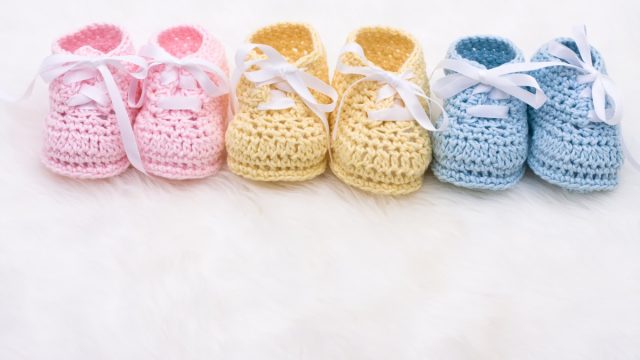Is It "Greedy" to Want a Third Child in 2019? Experts Weigh In
Everything two-time parents need to know

Fact: Fewer people in the U.S. are having babies than ever before. There were just 60.2 births per 1,000 women of childbearing age last year, according to data from the National Center for Health Statistics. That's down 3 percent from 2016. And their reasons are as varied as you would expect, from financial stresses to concerns about global instability and population growth. Interestingly, they're not avoiding parenthood entirely. In a New York Times survey last summer, 54% of respondents said they were having fewer kids because they wanted "more time for the children I have."
It's food for thought for anybody, but especially parents considering having a third child. After all, if you agree with one think tank, it's no longer environmentally responsible—from a population perspective—for one family bring more than two children into the world. And given the costs of raising children, the term "third child status symbol" is actually a thing. But, in 2019, one can't help but ask: Is it enough to simply "want" a third child—or do you need a justifiable reason for bringing yet another human being into the world when you're already so lucky to have two?
We talked to several experts and studied the research on what that third kid actually means for the bigger picture. For your consideration, here are the two most compelling arguments, for both why you absolutely should add a third child to your brood, and why you might want to think twice before becoming a parent for the third time.
Why You Shouldn't Have a Third Kid
Having your first child can bring bliss and unconditional love, unlike anything you've ever experienced before. You get the same jolt of joy with your second kid. But according to a 2014 study from the London School of Economics and Political Science, parents don't experience the same overwhelming feelings of happiness with the arrival of their third child.
"This is not to suggest they are any less loved than their older siblings," says the study's co-author Mikko Myrskylä. "Instead, this may reflect that the experience of parenthood is less novel and exciting by the time the third child is born."
It also brings more stress. A Today Show survey in 2013, which polled over 7,000 mothers, discovered that having a third child is substantially more stressful than just having one or two. Surprisingly, a third even brought more stresses than having four or more children. The increased stress was caused by exactly what you think: Financial worries, the extra commitment for care and attention, and everything else that comes along with raising a kid.
Why parents felt less stress with four or more kids is open to debate. It's possible that with three, parents feel the extra burden from two, but with four or more kids, you're already dealing with a crowd so what's one more? Your guess is as good as ours.
Outside of your own happiness and stress, there's also the matter of what bringing another human being into the world will mean in a larger sense. A 2017 study published in Environmental Research Letters suggested that having fewer children—along with other behaviors, like flying and driving less and sticking to a plant-based diet—could have a huge impact on fighting climate change. The researchers calculated that carbon emissions must fall by at least two tons of CO2 per person by 2050 to avoid severe environmental consequences, and currently emissions are around 16 tons per person every year in the U.S. alone.
But having just one less child could reduce those carbon emissions by up to 58 tons, according to their findings. "That's from a life-cycle perspective," says Kimberly Nicholas, a Swedish professor at Lund University and one of the research team. "It accounts for all the climate impacts a child would make in their life, and in the lives of their descendants."
Put simply, she adds, "in countries with high emissions rates, adding more people adds a lot more carbon to the atmosphere—and their children will add more still."
Alistair Currie, a spokesperson for Population Matters, a charity concerned with sustainability and population, says that more people are choosing to have smaller families because they realize that it's not just a personal decision.
"Their decisions affect everyone," he says. "The ones who stand to benefit most from the decision to have small families are the kids we do have, of course. They'll inherit the problems we create, and we owe it to them to give them the best chance of solving them."
Why You Should Have a Third Kid
If your main anxiety about having a third kid is how much it'll cost, you may be in for a pleasant surprise. Yes, raising a child comes with unavoidable expenses. But according to the most recent USDA estimates, parents with just one kid spend about 27% of their household expenditures on raising that child, and that percentage rises to 41% when they have two children. But once a third kid is added to the mix, the overall expense of raising all three comes to just 47% of their annual expenses.
Now granted, that's still a lot of money. But it's just a 6% difference between kid number two and kid number three. In other words, if you had serious concerns about whether you could afford to be a parent, you probably should have stopped before you got to kid two.
Why is the number so low? Many expenses are lessened with a third kid because you're already well-prepared, with everything from baby gear like car seats and cribs to clothes. "There are definitely some economies of scale," says Laura Vanderkam, a mother of four children and author of books like Off the Clock: Feel Less Busy While Getting More Done. "Kids can share rooms. Kids can wear hand-me-downs. They can play with older siblings' toys. We've joined various zoos/museums in our area and generally the price is the same for four kids as it would be for one. We send our kids to public school, and it's the same cost (our property taxes) no matter how many kids you have."
Another huge benefit: You'll be the best parent you're capable of being by kid number three. All of the insecurities that come with being a first-time parent have disappeared. You know what you're doing now, and you're not as terrified that something horrible will happen to your kid the moment you turn your head.
"You get wiser parents with each kid," clinical psychologist Linda Blair explained in an interview with the BBC. "So third-borns grow up with more relaxed boundaries. These are the children most likely to be creative and risk takers. They can try anything. That third kid has lots of people to look up to." (Or, according to a parent in the wonderful 1989 film Parenthood, "By the third kid, you know, you let them juggle knives.") And that third kid is probably going to keep you in stitches. According to research at YouGov, 46% of people with siblings claimed that the third child in their family was far and away the funniest, not to mention the most relaxed and easy-going.
But there's still the pesky matter of guilt. Are you really helping to destroy the planet by having that third child? It may really come down to perspective. The person driving the gas-guzzling SUV that's pumping carbon dioxide into the air is clearly doing it for selfish reasons. So is the person who takes more plane trips than they need to, or eats a diet that's heavy in meat. But raising a child? It may add to our carbon footprint. But it also comes from a place of optimism about the future.
As psychologist Lyn Bender has explained in an interview, having children is "a supreme act of hope, even if you might not realize it."
Humans have always faced dangers to their survival, ranging from wars to natural disasters. But we've managed to persevere despite all of it. "When you hear that by 2050 there will be X amount of sea level rise or extreme weather events, you mentally calculate how old your children or grandchildren will be," Bender says. But perhaps your third child will grow up to become a climate change scientist, someone on the forefront in reducing emissions and finding solutions to our global crisis, she says. A car will never change the world, but a child is always capable of doing that.
But beyond any of this, the decision to have or not have a third child isn't about making the most air-tight case. All the logic in the world can't override your own biology.
"You can't close this issue until your body closes it," says Blair.
Women who decide not to have a third child, even though their natural instincts might be to get pregnant again, have "managed to allow logic to override their emotions," according to Blair. "The best way of thinking about it rationally can be to ask yourself, 'Will I be serving the best purposes of all the people here—my children and my partner?'"
And that, at the end of the day, is the only question that really matters. And however many children you choose to have, be sure to read these Brilliant Ways to Be a Happier Parent.





















